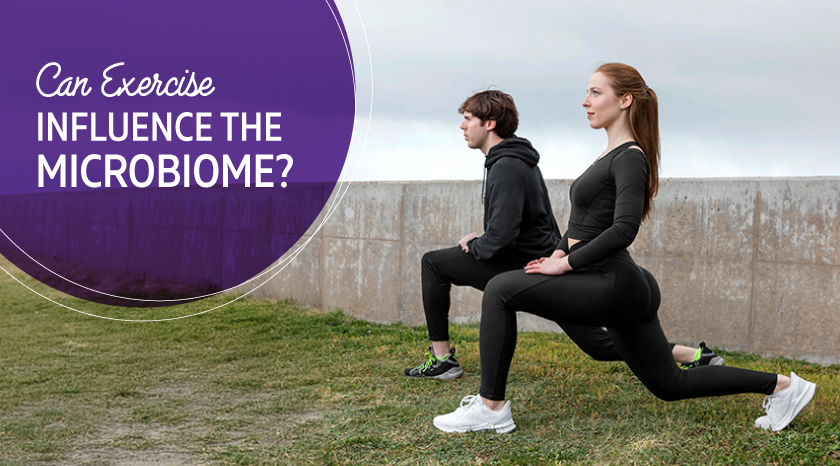In recent years, the connection between exercise and gut health has garnered significant attention. While it is well-known that diet plays a crucial role in shaping the gut microbiome, emerging research suggests that physical activity also has a profound impact on the composition and function of gut bacteria. Let’s explore how exercise can influence the microbiome and the potential health benefits associated with this interaction.
The Gut Microbiome: A Brief Overview
The gut microbiome is a complex ecosystem of trillions of microorganisms, including bacteria, fungi, viruses, and other microbes, residing in the digestive tract. These microorganisms are essential for various bodily functions, including digestion, immune response, and the synthesis of essential vitamins and nutrients. A balanced and diverse gut microbiome is crucial for maintaining overall health.
How Exercise Influences the Microbiome
- Increases Microbial Diversity:
- Studies have shown that regular physical activity can enhance the diversity of the gut microbiome. Greater microbial diversity is generally associated with better health outcomes, including improved digestion and a stronger immune system.
- A study published in the journal Gut found that professional athletes had a significantly more diverse gut microbiome compared to sedentary individuals.
- Promotes Beneficial Bacteria:
- Exercise can promote the growth of beneficial bacteria, such as those belonging to the genus Bifidobacterium and Lactobacillus. These bacteria are known for their positive effects on gut health, including enhancing gut barrier function and reducing inflammation.
- Research published in PLoS ONE demonstrated that exercise increased levels of beneficial bacteria in the gut, contributing to improved gut health and function.
- Reduces Inflammation:
- Physical activity has anti-inflammatory effects that can benefit the gut microbiome. Exercise-induced changes in the gut microbiome can lead to the production of short-chain fatty acids (SCFAs), such as butyrate, which have anti-inflammatory properties and support gut health.
- A study in the journal Translational Sports Medicine highlighted that regular exercise promotes the production of SCFAs, which help reduce inflammation in the gut.
- Enhances Metabolic Health:
- Exercise can improve metabolic health by influencing the gut microbiome. Physical activity has been shown to enhance insulin sensitivity and regulate blood sugar levels, partly through its effects on gut bacteria.
- A study in Cell Metabolism found that exercise-induced changes in the gut microbiome were associated with improved glucose metabolism and insulin sensitivity in humans.
- Supports Mental Health:
- The gut-brain axis, a bidirectional communication system between the gut and the brain, plays a crucial role in mental health. Exercise can positively influence this axis by promoting a healthy gut microbiome, which in turn can impact mood, anxiety, and cognitive function.
- Research published in Frontiers in Neuroscience suggested that exercise-induced changes in the gut microbiome could contribute to improved mental health and cognitive function.
Practical Tips for Incorporating Exercise to Support Gut Health
- Consistency is Key: Regular physical activity is more beneficial for gut health than sporadic exercise. Aim for at least 150 minutes of moderate-intensity exercise per week.
- Mix It Up: Incorporate a variety of exercise types, including aerobic activities (such as walking, running, and cycling), strength training, and flexibility exercises like yoga.
- Stay Hydrated: Hydration is essential for both exercise performance and gut health. Drink plenty of water before, during, and after workouts.
- Listen to Your Body: While exercise is beneficial, it’s essential to avoid overtraining, which can negatively impact gut health. Pay attention to your body’s signals and allow for adequate rest and recovery.
By prioritizing regular exercise, you can support a healthy microbiome and contribute to your overall well-being.
BIOM 3-in-1 Probiotics are specially formulated to balance the gut microbiome, ensuring optimal digestive health and overall well-being. This innovative supplement combines prebiotics, probiotics, and postbiotics in a single, powerful formula. Prebiotics serve as food for beneficial bacteria, promoting their growth and activity. Probiotics introduce live beneficial bacteria that help maintain a healthy balance in the gut. Postbiotics, the beneficial byproducts of probiotics, enhance gut health by supporting the intestinal barrier and immune function. Together, these components create a synergistic effect that not only replenishes and nurtures the beneficial bacteria but also ensures their sustained presence in the gut, leading to improved digestion, reduced inflammation, and enhanced immune response. BIOM 3-in-1 Probiotics offer a comprehensive solution for anyone looking to support and maintain a balanced gut microbiome.





